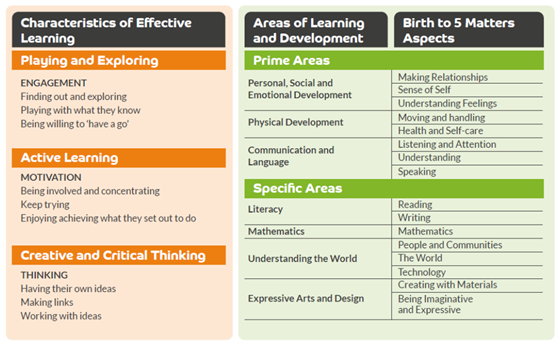Our EYFS provision is a carefully planned play-based learning approach that meets the requirements of the UK National Curriculum. Our staff provide a nurturing environment full of opportunities for children to learn through play in a way that is linked to their interests and developmental needs. Throughout their day in EYFS, children participate in a range of exciting learning which includes child led independent play, adult supported learning activities and short teaching sessions.
Play is essential to child development in their early years. Through play, children develop knowledge, language, their emotions and creativity, as well as their social and emotional capabilities. Children can practise new ideas and skills, they take risks, show imagination and solve problems on their own or with others.
Learning opportunities in EYFS
Daily teaching sessions
Our teachers deliver lessons in Literacy, Mathematics and Phonics every day. These are short ten-to-fifteen-minute sessions where children are taught new concepts, knowledge and skills that they can practise and apply in their play and adult supported activities.
Adult supported learning
We plan adult supported learning in a range of ways. The teacher may work with small groups of children to further teach and consolidate new knowledge and skills. Alternatively, teachers may join children in their play to support and extend their learning and challenge their thinking. This involves skilful questioning and careful modelling to ensure children’s play is intentional and purposeful.
Child led play allows children to pursue their interests in a safe, carefully planned and well-resourced learning environment. This can be independent, alongside others or as part of a group of children.
Curriculum in EYFS

The Characteristics of Effective Learning describe behaviours children use in order to learn. To learn well, children must approach opportunities with curiosity, energy and enthusiasm. Effective learning must be meaningful to a child, so that they are able to use what they have learned and apply it in new situations. These abilities and attitudes of strong learners will support them to learn well and make good progress in all the Areas of Learning and Development.
The Areas of Learning and Development are divided into ‘Prime’ and ‘Specific’ areas. Prime areas of development and learning lay vital foundations in the early years. The three Prime areas, Personal, social and emotional development (PSED), Communication and language (CL), and Physical development (PD), describe universal core aspects of early child development. Developmental steps missed at this early crucial stage are much harder to address later on, so it is crucial that children’s interactions and experiences in the first few years at home and in school support development in these fundamental areas.
The specific areas of learning and development provide children with the knowledge and skills they need to flourish in school and beyond in Literacy, Mathematics, Understanding the World and Expressive Arts and Design. Many aspects of these areas arise naturally for young children as they make sense of their experiences, such as an awareness of quantity, enjoyment of telling and hearing stories, finding out how things work, rhythm, and movement. Children often begin to represent what they understand with their own actions, marks or words. There are also ways of representing understanding with more formal symbol systems such as numbers, writing and other cultural tools and methods for sharing and recording ideas, as well as large bodies of knowledge to be shared with children.